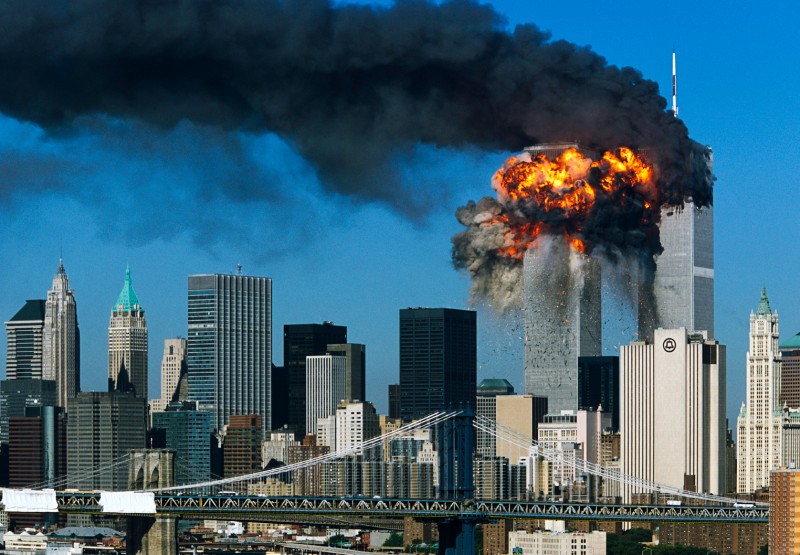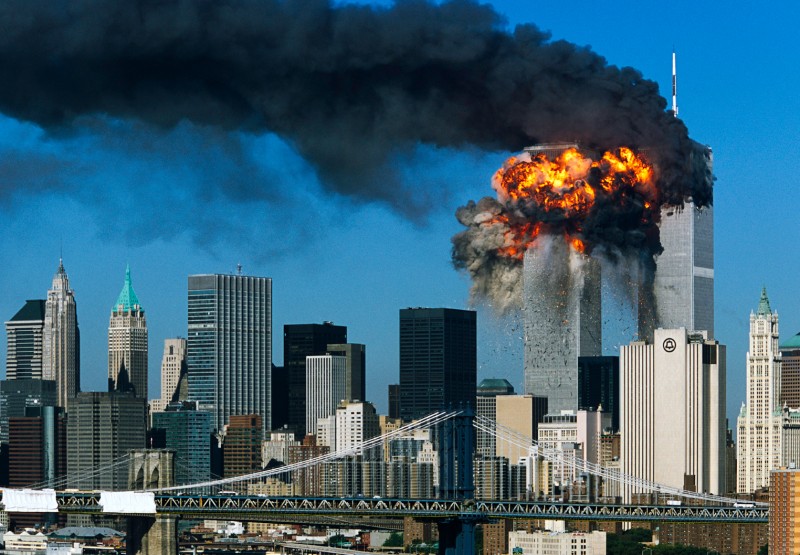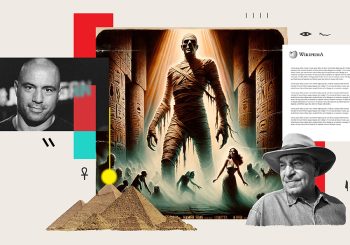
The Islamic State in Iraq and Syria, and now actively progressing through Libya, has been making headlines every week with a new horrific occurrence. The concept of ‘ISIS’ and their horrendous terrorist manipulations breached the minds of millions and left them sleepless with disturbance and terror. How did this all start? It seems as though this now infamous name appeared out of thin air. Ironically, the growth of such barbaric groups could be indirectly traced back to a set of well-known attacks.
The attacks that propelled two World Trade Centers plummeting down in a matter of hours left millions traumatized by the scenery. George Bush instantaneously attended to this occurrence in a prevailing manner.
The 9/11 attacks, along with Bush’s approach, could be easily explained by the Schachter-Singer psychological theory of emotion. This theory explains that human emotion is experienced through two integrated factors: physiological arousal and cognitional interpretation. The terrorism attacks act as the physiological arousal, which prime emotion. Contrastingly, Bush’s 9/11 speech wrought the superior and ulterior cognition that manipulated millions of people into slamming into a new era of political and social enigmas. Bush escorted the American community, preceding the global community, into this newborn epoch through his deceivingly pertinent syntactical and semantic adoptions.
In his post 9/11 address, Bush greets his nation with a subtle and appropriate greeting and then moves on to recognize the virtues of his nation: a united realm that was built upon the foundations of freedom. This statement was the leading notion prepared in his speech, which was precisely fabricated to precede the addressing of the attacks in order to appeal to his audience’s patriotic sentiment. By readying the American citizens with emotions of patriotism, Bush intended to guarantee that anything he would tackle later on would be accosted with mass belligerence against the threat. Additionally, Bush develops his flame inducing assertion and goes on to say, that his people were appointed to “defend a great nation”. This decree concocts the American public for a pristine battle. Moreover, Bush makes several assumptions about the intentions of the terrorist attacks, and completely dismisses exploration of the objectives of the perpetuators. He automatically assumes that these terrorists “intended to frighten” America into “chaos and retreat”. The appeal for the blood, sweat, and tears of the nation’s populaces is made, and it is pleading all Americans to come together and bout the terrorists.
Before September 11, 2001, the American people were considerably confident in their security and culture. The media played a crucial role in the understanding and representations of the modern American culture. Comedy shows, such as The Simpsons and Family Guy, which often deliberated political and current events in an obscure satirical manner, rarely attended to terrorism. It was palpable that after the 9/11 occurrences, the American community’s contemplations echoed frequencies of fear, radicalism, and stereotypes. After Bush operated his people into a “war against terrorism” and enthused them to offer their entirety to battle this corporate nemesis, which wanted nothing but to destruct the foundations and grandeur components in which this nation was built upon, America started going through a rapid political and cultural transformation. When Osama Bin Laden, along with Al Qaeda, claimed responsibility for the attacks, they put a label on these misdoings, and it was the religion of Islam. This religion was fairly novel and unfamiliar to millions of Americans, and this contributed immensely to the current crisis of negative stereotyping and racial profiling of people with Muslim or Middle Eastern background.
As George Bush’s cry for war and Bin Laden’s accountability declaration collided, Americans began associating the war on terrorism with the religion of Islam. This dogma was legitimized by Bush’s order to enter Afghanistan in 2001 and fight the Taliban, as well as his order to start the Iraq War in 2003. Media was responsive to these political events and instantaneously reacted. Muslim stereotypes were advocated and presented in TV shows, movies, and even comedy. Jeff Dunham’s ‘Akhmed the Dead Terrorist’ became a colossal sensation among Americans through its demonstration of a Muslim ‘jihadist’ puppet wearing a turban and wanting nothing but to ‘bomb the infidels’. Moreover, ‘Family Guy’ made several references to Islamic terrorism; one of which Stewie asks ‘Akhmed’ what it is “you people do when you’re about to assassinate an infidel”, and stereotypically, Akhmed replies with a shouting, repeated ‘lalala’. Unsurprisingly, Akhmed is dressed in a traditional Middle Eastern head garment (the “smagh”) and has a beard.
As this stereotypical trend gained popularity, many individuals acted accordingly and took the ‘war against terrorism’ phrase personally. Peaceful Muslims were targeted worldwide and hate crimes began spreading. Fourteen years after the 9/11 attacks, Muslims are still being beleaguered with detestation criminalities, such as the Chapel Hill shooting, in which an atheist male shot three UNC Muslim students in the head, brutally murdering them. This sort of racial discrimination, such as the burning of the Islamic center in Houston in February, mirrors the horrific events that took place in Missouri against the African American population in the 1900s. Bush commenced a new era of American racial and religious targeting, which ultimately, will not be a tranquil commission to overcome as a nation.
As a Muslim teenager growing up in the post nine-eleven era, the product of Bush’s address disturbs me first and foremost like no other. After having to constantly adjust to my treasure, my peaceful, beautiful mother being mocked and scowled at for choosing to wear a ‘hijab’ out of adoration for her religion, I did not only develop a sense of numbness towards Islamophobes all around the world, but I have also grown to unequivocally and unreservedly despise anyone who chooses to slaughter in the name of religion. Moreover, millions of people deem that the formation of ISIS was due to Bush’s intervention in Iraq, and after the American forces retreated from the area, certain cancerous ideologies started forming. Bush’s approach towards these insane Islamic interpretations and beliefs, which initially emerged from his 9/11 Speech, generated a paradoxical effect, which resulted in the materialization of several prominent ‘Islamic’ regimes, such as the previously mentioned ISIS, and the Muslim Brotherhood in Egypt and several North African nations. These sanctions increased in popularity in the Middle East as people hoped for a new ‘Islamic’ revolution as a backfire for Bush’s policy on Islamic terrorism.
Personally, I have had to witness my home country nearly fall into ISIS rheostat, and consequently, various acquaintances have participated in military operations aiming to resist a monstrous ISIS takeover. I have had to perceive constant reminders that 21 fellows of my own kinfolk have been slaughtered in the adjacent country of Libya. I have had to mature with the persistent notice that my home could vanish under any circumstances if certain entities kept advancing in North Africa and the Middle East. I have had to live with Bush’s choice to contest a faith instead of an entity.
“You never change things by fighting the existing reality. To change something, build a new model that makes the existing model obsolete.” – Buckminster Fuller.
When Bush regimented the prodigious American people to partake in a ‘war against terrorism’, he formulated a new period of discrimination, struggle, and continuous travail. As Medgar Evers once said, “You can kill a man, but you can’t kill an idea”. Bush’s principal controversy was that he led his army and realm into a battle against a conception.
Although the debate that Bush’s call to war was necessary to prevent future terrorist Islamic attacks will prevail, it is unmistakable that the world has experienced a sky-rocketing number of terrorist assaults in Nigeria, Pakistan, etc.; weapons of quantitative annihilation have never, and will never abolish an idea. A genuine battle in contradiction of terrorism should be tussled with its counterpart, which is peace. The only appropriate technique in which a carcinogenic ideology can be overcome is through the introduction of an inhibitory philosophy. As the world lingers in its struggle against sabotage in the name of religion, a question arises of when an unpretentious emblem of refurbishment will upsurge.
Edited by Karim Hafazalla








Comments (10)
So you’re telling me that Bush started ISIS (through the way you recount events leading up to this)? I see you mention the psychological and emotional response but your psychological response to these events falls under the label “transfer of blame.” If Bush’s response started ISIS, then you are saying that every other muslim in the world should be a terrorist since Bush “declared a war…against the religion of islam.” So, explain why not all muslims are terrorist? It’s because of each individual’s response to Bush and everyone else’s actions (and the teachings of extremists). So if some respond in peace and some respond in terror, how again is Bush responsible for the actions of those individuals that respond in terror? Are they too feeble minded to respond like compassionate human beings…or is the fact they weren’t taught compassion…so they cannot respond in such a way that doesn’t exist in their psyche?
The fact that the Chapel Hill killer was an atheist is irrelevant and should not have been mentioned. He was a gun fanatic, no doubt a racist, but there is no indication that he killed because he was an atheist. Atheists very rarely commit terrorist acts, especially compared to the huge numbers who commit terrorist acts because of their perverted views of Christianity, Judaism, and Islam.
http://www.blogos.org/compellingtruth/does-religion-cause-war.html
Hitler was an atheist. So was Stalin. Look what happened there.
Atheism is not a belief, it is non-belief, it can neither prevent you from doing something nor motivate you to it. Hitler and Stalin needed ideologies to motivate their followers and justify their actions, in that they had more in common with religious leaders than atheists, as well as their personal traits of sociopathic non-empathy and ruthlessness.